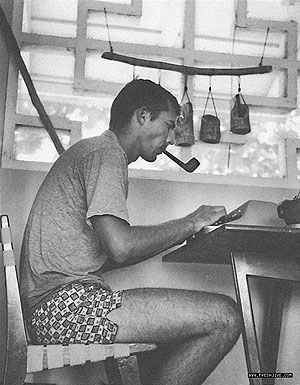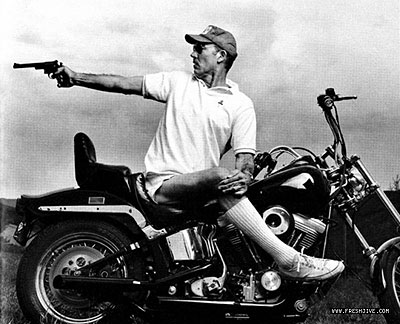The Cult Of Hunter S. Thompson
Published on January 30th, 2012 in: Books, Issues, Media, Oh No You Didn't |By Paul Casey
“We were somewhere around Barstow, on the edge of the desert when the drugs began to take hold.”
Coupled with Bruce Robinson’s Withnail & I, there is no more cherished catharsis for the teenage crowd than the work of Hunter Stockton Thompson. Or the drunk crowd. Or the drugged crowd. Or the drunk and drugged teenage crowd. Hunter Thompson’s Fear and Loathing in Las Vegas, and the wonderful Terry Gilliam adaptation starring Johnny Depp and Benicio Del Toro, are the blueprint for so much debauchery and casual destruction. Apart from the compelling joys and miseries of sucking from the Gonzo cock of hyperbolic substance use, Thompson is one of the most emulated crusaders in the truth game.

Photo from FreshJive.com
It may be the law student who unwisely sees himself as a bloated Oscar Acosta—the basis for Dr. Gonzo—warring against the tide of American Imperialism by way of butchered quotations and a hangover. It may be the tedious party goer who shaves his head and buys a cigarette holder and goes around slapping people on the side of the head with cupped hands. It may be the alcoholic who drinks a bottle of wine alone in his living room while watching My Breakfast With Hunter upside down. All of which are dreadful symptoms of the Cult of Hunter S. Thompson.
“We are living in dangerously weird times now. Smart people just shrug and admit they’re dazed and confused. The only ones left with any confidence at all are the New Dumb. It is the beginning of the end of the world as we knew it. Doom is the operative ethic.”
Hunter S. Thompson was a serious journalist. He was not a walking affectation or a mad man. He was the writer of Hell’s Angels, a brilliant insight into the life of a violent, frightening America, innovating an “impressionistic style” of journalism that would help to define the ambitions of countless less talented imitators. For as many as have imitated his life’s work in print and on film, it is the casual imitator that most galls. Viewing the horridly clean, jock-minded expression of his work, without any of the wit, irony, or truthful exaggerations, is to weep for the literal minded.
Thompson was not a bully, for all of his fierce words and appreciation of powerful explosives. This is the guy who stood up to the Hell’s Angels and got beaten for his trouble. He could not be defined by such insufficient labels as left or right, which is probably why many have attempted to suck the politics out of his work. Thompson is easier seen as the man who drugs couldn’t kill, as an extension of the hard-on house party, the unthinking, backwards poster boy for the thick-dicked woman hater. That his greatest work, Fear and Loathing on the Campaign Trail, is his least acknowledged by the Cult of Thompson is a tip-off. Complex ideas are no match for the allure of “Holy Jesus!” and a cocktail in hand.

Photo from FreshJive.com
Thompson worked in the transgressive mode for much of his career. His aim was to shock, but rarely for its own sake. Even up until his last (mostly) original work, Kingdom of Fear, his commitment to certain individual freedoms—especially those involving guns—are prone to make liberals uncomfortable, while his commitment to other individual freedoms—sex, drugs, and dubbing George W. Bush a “whore beast”—spoil whatever joy right wing fellows could get from his need to blow shit up.
Hunter S. Thompson is not meant to be an idol. He is someone who should inspire, motivate, and fuel creativity, dissent, and pure individuality, sure. If you have read his work though, and have not yet encountered something which you disagree with, which strikes you as morally dubious, or frightens you, you are reading it wrong. In those moments when he pushes you off balance, makes you justify beliefs you have held forever but never questioned, Thompson shows himself to be so much more than his Doonesbury caricature.
As one of the most gifted writers of his generation, Thompson could have turned his energy towards any subject and been as insightful and entertaining as he was on politics, the American Dream, and the basic rightness of hard liquor. One of the things which he showed tremendous aptitude for was the subject of music. It runs through his work (not least of which in Fear and Loathing in Las Vegas), yet there are few examples of his focusing on it for its own sake. This is a terrible shame.
“Music has always been a matter of energy to me, a question of fuel. Sentimental people call it inspiration, but what they really mean is fuel. I have always needed fuel. I am a serious consumer. On some nights I still believe that a car with the gas needle on empty can run about fifty more miles if you have the right music very loud on the radio.”
Few have had the flow of words, or the ability to use the keyboard as an instrument in such a brutal, forceful manner. The comedy of Fear and Loathing and its savage commentary may have kept me reading, but it was Thompson’s love of the beauty and truth in life—not in the substances he ingested or the women he fucked—that made him one of the twentieth century’s greatest artists.
That Thompson did in some significant way succumb to a Raoul Duke narrative of his own making is sad. That many worship him as a castoff of Animal House is sadder still. Like his person, Hunter S. Thompson’s work demands a careful eye. Please arm yourself with his best work—Hell’s Angels, Fear and Loathing in Las Vegas, On the Campaign Trail, The Proud Highway—and some musical fuel. Just remember, don’t turn your back. His words are so much more dangerous than a fire extinguisher.
2 Responses to “The Cult Of Hunter S. Thompson”
February 6th, 2012 at 12:06 pm
good piece
February 6th, 2012 at 1:13 pm
Hunter S. Thompson made me finally understand why sports writing can be some of the most transcendent prose – his columns on ESPN.com changed forever the way I look at football.
Time limit is exhausted. Please reload the CAPTCHA.